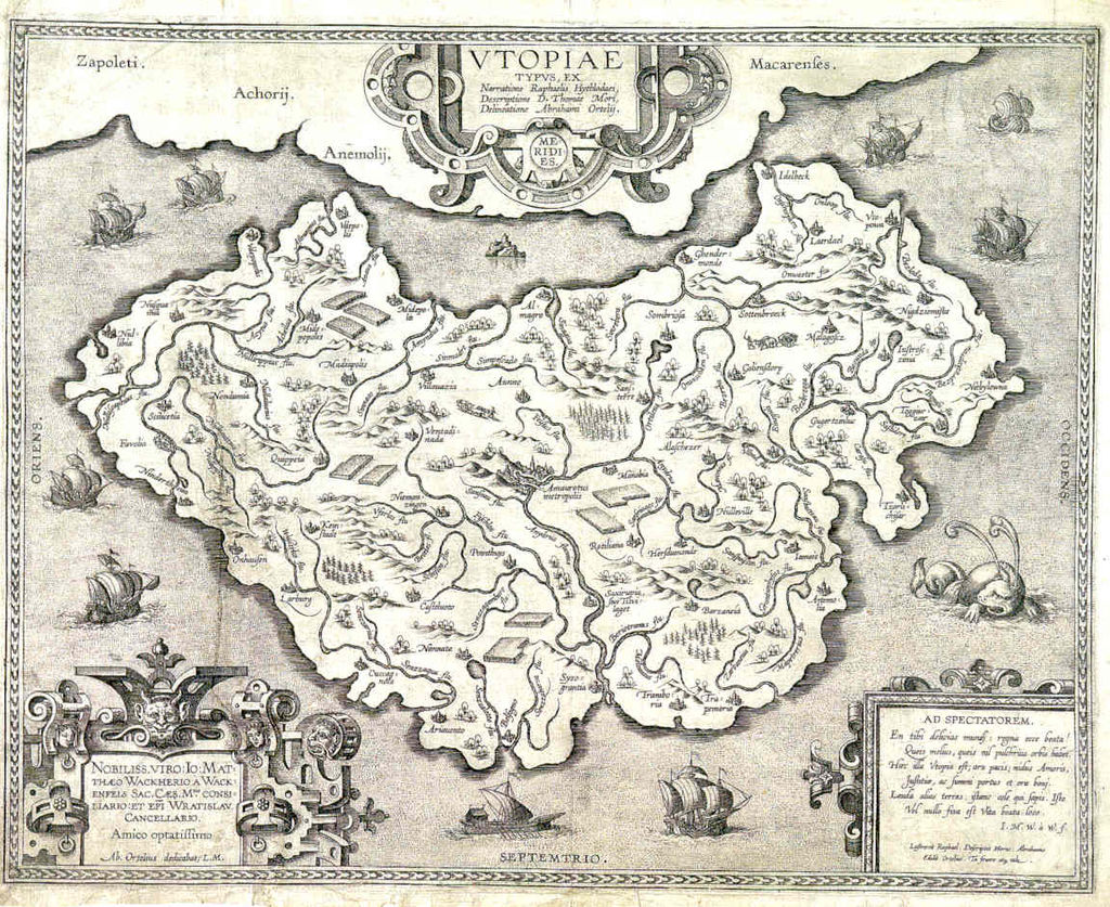
Dream states
Five centuries ago, the English lawyer, cleric and statesman Thomas More published a book called Utopia. In doing so, he gave a name to a genre of thought experiment which is arguably as old as civilisation itself, and which shows no signs of losing its appeal.
In Utopia, More imagined an isolated island whose inhabitants live under a social order radically different to that which prevailed in the Renaissance England of his day: in it, for instance, there is no private property regime, all work is open to both men and women, and religious toleration is mandatory. Such a radical reimagining of society would have been highly contentious in the Tudor context of sectarian conflict between Catholics and Protestants – which goes some way to explaining why it was only published in England three decades later, long after More had been executed for an unrelated treason.
Utopianism is back in the day-to-day discourse, if indeed it ever went away. But we have become accustomed to the term being a pejorative, associated (implicitly or explicitly) with the failure of communist state-building projects: this is to present utopia as a dangerously naive form of political fantasy, and not without some justification. The utopian label has also been applied to various 20th-century dictatorships and 'banana republics', and most recently to the self-styled Islamic State. Based on the way the term is commonly applied, then, it is clear that we conceive of utopias as being fundamentally ideological in character: as a blueprint for a perfected society, whether in religious or sociopolitical terms, or both.
The literary and political phenomenon which we retrospectively label as utopianism is the same thing we now label as futurism or foresight, town planning or urbanism
But this in turn suggests that the category of utopias is larger and more contentious than it might initially appear: after all, if the Communist Manifesto was a blueprint for a perfected society, then the same must surely be true of the United States Constitution. The Manifesto and the Constitution both attempt to define a perfected social order – and while their respective admirers would likely bridle at the utopian accusation, with its implications of naivete and outright fictionality, they would likely level those same accusations at any opposing ideological narrative.
As such, 'utopianism' has become an accusatory stick with which to beat an opponent's vision. But there is an argument to be made that all sociopolitical futures, regardless of their position on any given axis of political thought, are utopian projects – or, more plainly, that the literary and political phenomenon which we retrospectively label as 'utopianism' is the same thing we now label as 'futurism' or 'foresight', or 'town planning' or 'urbanism'.
Leaving aside the partisan issue of who is or isn't a utopian and whether that's a bad thing or not, we can approach a more important question, namely that of purpose. Inherent in utopia's current bad name is the prevalent implication that utopias are intended as blueprints, or plans – but that is not the only way of writing (or reading) them.
Our weekly newsletter features a roundup of the best stories of innovation from around the web
NewsletterThis subjectivity is implicit in the name of the genre: More coined the term utopia from the Greek οὐ τόπος, which translates literally to 'no place', but in English utopia is homophonous with eutopia – εὖ τόπος, which translates to 'good place', making More's title an ambiguous pun. This duality of meaning extends to More's book itself, with the scholarly jury still out after centuries: was More proposing what he thought of as a possible perfected society (utopia as 'good place'); or was he instead doing a subtle satire on the impossibly contradictory strands of social, political and religious thinking prevalent in Tudor England (utopia as 'no place')? Or was he perhaps doing both at once?
We will never know for sure – but I'd argue that it doesn't matter, because that very problem of interpretation is what allows us safe access to the subjectivities that make politics so difficult. First, however, let's look at the basic requirements of a utopia, and what happens when they are indeed treated as blueprints.
The Space Between All Things
From a literary perspective, the base ingredient for a utopia is some sort of tabula rasa: after all, the most obvious obstacle to building a new society is the very society that you are attempting to supersede. This is why literary utopias are always distant, whether in space or time, or both: More's island has to be geographically far from the hegemony of church and state to be even vaguely plausible, for instance; while the more technologically oriented utopias of science fiction tend to rely on the passage of time to clear the decks.
It follows, then, that the realisation of a utopian project in the 'real' world would likewise necessitate a similarly blank slate. There are – or were – two ways to get one: you either found and occupied some land that didn't yet belong to anyone else, or you convinced those who were already there that you were now in charge and they'd better get used to it. In practice, the former almost always turned out to be a variation on the latter: what the Communist Manifesto, the US Constitution and the doctrine of Islamic State have in common is that urge to impose a utopian settlement – they are top-down projects, intended to permanently remap a territory in one's own ideological image.
Original Pirate Material
But there is also a similarly lengthy tradition of bottom-up utopias, from the anarchic (and possibly fictional) 'free port' pirate utopias of the Barbary corsairs, through the Diggers and Levellers and various peasants' movements, and on into the present day. The Eurostoner's paradise of Freetown Christiania in Copenhagen is a rare example of an interstitial pirate utopia that has persisted for decades. Formed in 1971, when the city's countercultural underclass began squatting disused barracks on land belonging to the military, and inescapably reliant economically on the trade in controlled substances, Christiania has nonetheless lasted a long time in the face of widespread public opposition – presumably because it serves a purpose both as a societal safety-valve (or zone of exile, perhaps?) and a convenient folk devil for local politics.
A more extreme example would be the nigh legendary Kowloon Walled City, a former enclave of the New Territories leased to the British after the Sino-Japanese war of the 1890s, which the Chinese government sought to reclaim after the defeat of the Japanese in the second world war by offering protection to would-be squatters. It eventually went rogue – or was perhaps permitted to go rogue, once the British realised how hard it would be to shut down. Organised crime, prostitution, gambling and drugs propped up the local economy of the squatter population until it was finally evicted and demolished in 1994.



Otherwise, ephemerality seems to be the pirate utopia's defining feature, as captured in its other name, 'Temporary Autonomous Zone'. Brits of a certain age may remember turning on the news 25 summers ago and seeing a quiet country town named Castlemorton turned into an unplanned and unstoppable ravers' utopia for a whole weekend; those who don't will certainly remember the ensuing moral panic, and the introduction of laws to make sure it never happened again.
The pirate utopia is always already temporary, contingent, a movable feast. Rather than imposing a new narrative on a space, it looks instead for loopholes in the old one. It survives by exploiting the interstitial weaknesses that the ruling narrative cannot (or will not) fix fast enough; but it may survive if it is somehow supported or confirmed in its role, covertly or otherwise, by the agents of narratives antagonistic to that of the host state (as with Kowloon Walled City), or by the host state itself (as with Christiania).
The appeal of the pirate utopia to its citizens is rooted in its offer of freedom from certain restrictions imposed in the world outside. This is the appeal of all utopias, including the technological subtype once exemplified by 'golden age' science fiction, which burgeoned with Competent Men, Big Engineering and Yankee pragmatism.
This genre is alive and well not only in science fiction's greying fandoms, but in the global technoscientific discourse: while they lack the obsessive detail and vast scope that characterises more knowingly utopian narratives, the oft-repeated moral mythology and solutionism of Silicon Valley reveals its true nature – that of a utopian metaproject whose only purpose is to generate more utopian projects, its borders artificially shored up by the generous support of its host state.
The solutionism of Silicon Valley reveals a utopian metaproject whose only purpose is to generate more utopian projects, its borders artificially shored up by the support of its host state
As such, Silicon Valley might be thought of as a privateer utopia once we recall that the difference between a pirate and a privateer was that the latter carried a 'letter of marque': a document which excused piracy so long as it was performed (ideally with some degree of deniability) in the service of the sponsoring state. As architect Keller Easterling has pointed out, 'special economic zones' and 'free trade zones' are also privateer utopias, as are their more technologically focused successors, 'technology parks' and 'smart cities'.
SEZs and FTZs are regions in which special concessions on tax and/or employment law are made in order to attract transnational businesses. This idea is at least as old as the Romans, as Easterling points out, but the contemporary model is based on Hong Kong's special status in the years immediately after the Korean war. Technology parks extend the FTZ model to include the provision of infrastructures and other accommodations that are otherwise non-standard in the host region: air-conditioned office space, broadband, satellite connectivity, resilient sanitation, and other trappings of the developed world.
The so-called 'smart city' simply raises the technological ante another notch, promising not only an entirely automated and self-managing utopia, but one from which regular rents of both capital and data might be extracted. Designed as literal states of exception from the sociotechnical, economic and regulatory hegemony of the host, they are Castlemortons of capitalism: a glorious splurge of consumption and excitement for its temporary citizenry, with the abandoned consequences left behind for the locals to puzzle over, like the mystery-spackled Zone of Roadside Picnic.
The Literary Laboratory
Regardless of your opinion of the goals of any given actually existing utopia, it seems pretty clear that actually existing utopias tend to fail, and that the cost of failure tends to be borne largely by those upon whom the utopia has been imposed. Surely, then, the negative connotations of utopianism are justified? I would argue otherwise: I would argue that to focus on the failures of 'good place' utopias, of utopias taken as blueprints, is to overlook the successes of 'no place' utopias, of utopias taken as sandboxes.
To focus on the failures of 'good place' utopias, of utopias taken as blueprints, is to overlook the successes of 'no place' utopias, of utopias taken as sandboxes
To do so is not to deny the limitations of the form, but to embrace them. Utopian narratives are inherently idealistic, because any narrative is necessarily far less detailed and complex than the world it purports to represent; whether deliberately or not, an uncritical utopian narrative necessarily excludes those events and actors that would undermine the society they are intending to portray.
But a critical utopia – a utopian narrative which is reflexive about its challenges and limitations, and which examines the utopian project while it undergoes its inevitable failure – makes use of the blank page of literature as a sociopolitical sandbox, bringing societal ideals into dialogue with the messiness of human realities, and opening up a space in which various futures might be tested to destruction with few or none of the real-world consequences of the failure of large-scale social projects.
This, for me at least, has always been the true promise of futures and planning: while the organisational foresight industry continues to churn out blueprints for technofetishistic 'preferred futures', the disciplines of critical futurism, experience design and design fiction have turned the utopian impulse to its best use, namely the provocation of debate and discussion.
Is this (re)conception of utopia in itself utopian? Well, perhaps. I think you can decide for yourself.